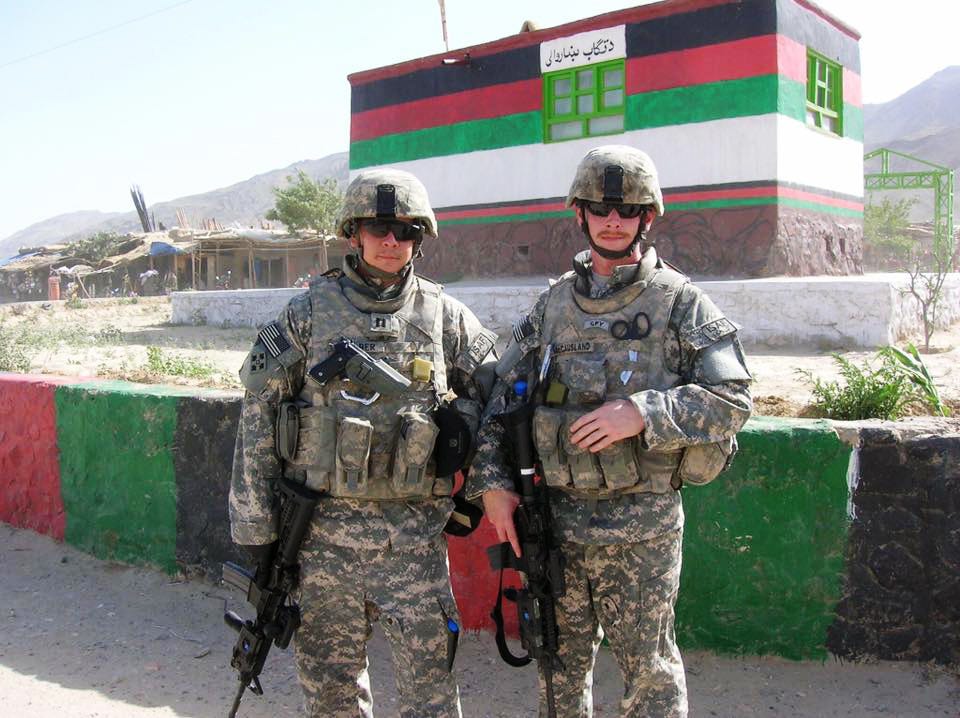
What JD Vance Gets Wrong About Afghanistan
His comments about refugees and interpreters are wrong. In making them, he joins a host of others who have let down those who fought the war.

RITCHIE WAS THE FIRST AFGHAN INTERPRETER I helped get to the United States. It was a miracle he made it.
Like all of my combat interpreters, his story is one of courage, resilience, and, eventually, betrayal. It’s a story worth revisiting now amid a renewed debate around the war and those who helped us in it.
Ritchie and I met in 2008 while I served on an Afghan Provincial Reconstruction Team (PRT). Ritchie served on a forward operating base in Tagab, Kapisa. As the other local interpreters would say, “Kattarnak, tooran Will, dera dooshman” (It’s dangerous, Capt. Will, a lot of enemies). But he was having a blast, hanging with my brother in arms, Capt. Casey McCausland.
Then, one day, Ritchie was on a mission into a valley with one way in and out.
On April 29, 2008, Qari Baryal, who is currently governor of Kabul Province and is still allied with al Qaeda, led an improvised explosive device network that killed Senior Airman Jonathan Yelner and severely injured Ritchie. Overnight, he went from making an excellent living to being a double amputee.
In Afghanistan, this all but guarantees a life of poverty. And the next PRT had to kick Ritchie off the base because he was no longer able to serve as an interpreter. So Ritchie moved out of Bagram Airfield—and lost all the protections it afforded him.
For the next few years, a group of officers raised money to help Ritchie’s Special Immigrant Visa (SIV) case. One would think that a double amputee who helped U.S. forces would go to the front of a very long line.
But it took nearly three years for him to reach the United States. We had to provide him with money to help him survive. Eventually, I bought him a ticket to Islamabad, Pakistan, to conduct his face-to-face interview, a crucial step in the convoluted SIV process that only a bureaucrat could construct.
Why go to Islamabad? Because the United States Embassy in Kabul didn’t conduct SIV interviews until the mid-2010s. So Ritchie had to go into Pakistan, where the intelligence services kill Afghan interpreters for fun.
But he went, survived, and made it to the United States in 2012. Eventually, Ritchie got better prosthetics and brought relatives to America. He’s currently raising his family in a quiet corner of California, not far from where Senior Airman Yelner rests.
I’ve been thinking about Ritchie recently, his journey to the United States, and the country and life he left behind.
He was on my mind when old comments from JD Vance resurfaced, in which Vance questioned the merit of bringing Afghan refugees to the United States, wondering if all of them were pretending to be interpreters to get entry.
“Apparently, Afghanistan is a country of translators and interpreters because every single person that’s coming in, that’s what they say is this person is: a translator and interpreter,” Vance said.
I thought of Ritchie as the third anniversary of the withdrawal from Afghanistan came and passed.
And I thought about Ritchie when I saw on the news that Vance said Vice President Harris could “go to hell” for criticizing Donald Trump’s decision to join (and take photos ops) with Gold Star families at Arlington National Cemetery to commemorate that anniversary.
Ritchie felt that the Biden administration betrayed Afghanistan by fulfilling President Trump’s foolish Doha Agreement. But he also loves America, even after it let the Taliban and al Qaeda reconquer his country.
He’s been an American citizen for nearly a decade. And despite dealing with phantom pains and working grueling hours as a security guard (yes, he’s a disabled security guard), he never complains about the fate that the war gave him.
“No matter what, brother,” he always says, “my daughters can be whatever they want to be. I’m the lucky one.”
THE BETRAYAL OF PEOPLE LIKE RITCHIE doesn’t belong to one political party.
Trump deserves blame. It was his special representative for Afghan reconciliation, Zalmay Khalizad, who got Mullah Baradar, the deputy Taliban leader, released from a Pakistani prison in 2018. And it was his secretary of state, Mike Pompeo, who was fleeced by Baradar into signing the Doha Agreement, one of the worst deals in American history.
That surrender agreement was the poison pill that killed the Afghan government. It was Pompeo’s threat of suspending military aid that pressured Afghan President Ashraf Ghani into releasing 5,000 Taliban prisoners (who, in turn, killed tens of thousands of our Afghan allies and eventually toppled the government).
And, of course, there is the Biden-Harris administration, which also deserves its fair share of blame. Biden’s legacy in Afghanistan is rotten—for deciding foolishly to retain Khalizad; for maintaining a burgeoning relationship with a terrorist group that killed 3,000 Americans; and for adhering to the Doha Agreement, even as the Afghans were buckling under it.
Biden made the choice to go along with Trump’s shameful policy. He implemented a surrender agreement that was shorter than my Best Buy credit card application. Harris has done nothing to distance herself from it.
Vance may not think Afghan interpreters deserve to be trusted, but Ritchie proved himself. The question is why either of them thinks America should be trusted.
THE SIV PROGRAM HAS BEEN BROKEN since well before I got Ritchie to the United States in 2012. Nobody, Democrat or Republican, has fixed it. However, under the Biden administration, it is working better than before, and Afghans continue to make it to the United States.
I wonder: Would the Trump administration try to uphold our promise to our Afghan allies? Maybe. Many Republicans in Congress were hesitant to extend the last SIV quota, as meager as it was. And Vance’s comments from 2021 weren’t a one-off.
“Just because they helped us allegedly doesn’t mean you have to let them come to Pittsburgh,” Vance said just three weeks ago. “Maybe some of them should go to other countries. Maybe we should help some of them in their own country.”
What a thought. Afghan refugees are scattered across the globe. I know men who are currently in Brazil, Russia, and Turkey. There are even Afghan refugees who found refuge in Rwanda.
Will a future Trump-Vance administration guarantee the continuation of America’s SIV program? Would Trump agree to allow the current numbers of Afghan refugees to enter under the P-1 and P-2 programs?
I fear not. There’s plenty of reason to suspect that they would turn off the pipeline of Afghan refugees entirely until they can “figure out what the hell is going on.”
When I visit Ritchie these days, we often see Yelner’s grave. We mourn together because he’s not just my former combat interpreter; he’s my brother. He, Lee Millis, and I are all that is left of Team Southern Kapisa. Qari Baryal killed Yelner that day, and our brother, Capt. Casey McCausland, died from a broken heart in 2013. Lee, Ritchie, and I—along with a motley crew of Iraq and Afghan combat veterans—attended his Irish wake. Ritchie was at my wedding in 2018 and my retirement ceremony earlier this year. He loves my daughter, and I love his.
Ritchie got out. Even as a double amputee, he could be considered one of the lucky ones. Tragically, the real victims in this tragedy are the Afghan people, who continue to suffer under an unimaginable hell that we cannot even fathom. Both parties are to blame.

















